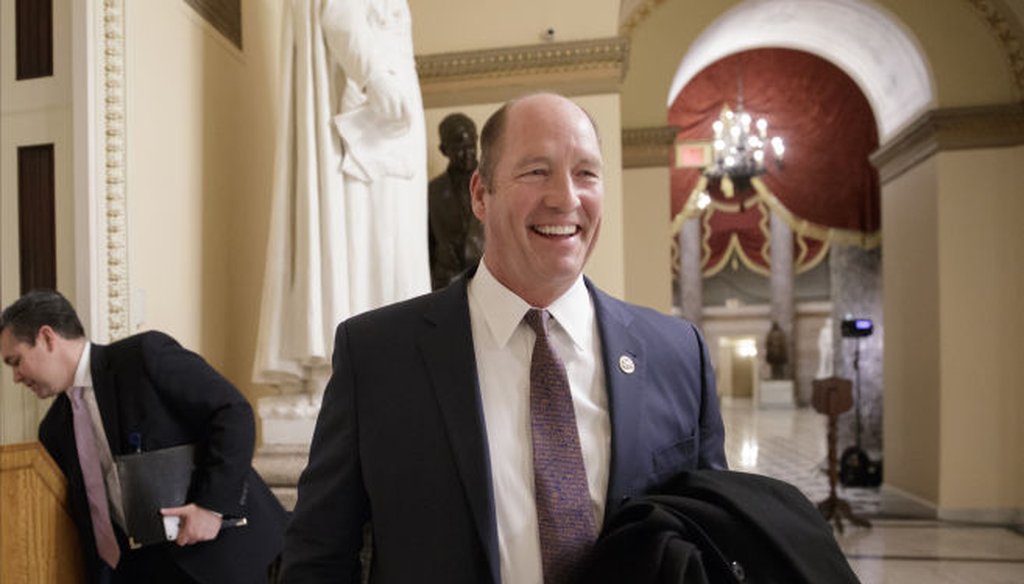Stand up for the facts!
Our only agenda is to publish the truth so you can be an informed participant in democracy.
We need your help.
I would like to contribute

Freedom Caucus member Rep. Ted Yoho, R-Gainesville., smiles after a TV interview on Capitol Hill in Washington March 23, 2017 before the Republican health care bill was pulled. (AP)
Florida U.S. Rep. Ted Yoho misleads on claim about Medicaid
U.S. Rep. Ted Yoho, a Florida Republican, is a frequent critic of the Affordable Care Act but opposed his party’s health care plan.
The ACA passed under President Barack Obama included the expansion of Medicaid, a program that provides health coverage for about 74 million poor Americans. (Yoho’s state of Florida rejected the expansion.)
Yoho, a member of the House Freedom Caucus, says the law has driven people to Medicaid, a program he described as a worldwide failure.
"With the Affordable Care Act, what’s happened is, all these people have been running to Medicaid, and it’s been proven over and over again Medicaid has the worst outcomes in the industrialized world as far as the quality of health care," he said in a March 14 interview on PBS, about a week and a half before the Republicans canceled a vote on their health care plan.
Yoho spokesman Brian Kaveney walked back the congressman’s statement somewhat when we asked for evidence that Medicaid has the worst outcomes in the industrialized world.
"Hindsight being 20/20, the congressman didn’t mean to use the word ‘worst,’ " Kaveney said. "The congressman was pointing out that since the implementation of ACA, health care trends have not improved."
Kaveney added: "To say that Medicaid expansion under ACA has resulted in better health outcomes would be a very debatable point."
Experts we interviewed about Medicaid outcomes said they were unaware of any research comparing Medicaid outcomes with the rest of the industrialized world.
Leighton Ku, an expert on health policy at George Washington University, said that Medicaid improves access to care for poor people, but research about outcomes comes with caveats.
"There is no question -- and there is a lot of research -- that Medicaid improves poor people's access to health care, in terms of seeing a doctor, getting medications, etc.," he told PolitiFact. "The problem with comparing health outcomes is that Medicaid recipients start out sicker, both because they are poor, but also because people who are sick really need to get Medicaid to get access to care, while healthier poor people may go uninsured because they don't need much care."
Studies about Medicaid
Yoho was referring to two articles in 2017 by Oren Cass, a senior fellow at the conservative Manhattan Institute and a policy director for Mitt Romney’s 2012 presidential campaign.
Cass argued that Medicaid studies show that the program doesn’t improve public health. But there aren't studies comparing its health outcomes to other industrialized countries.
"Whether people on Medicaid have better or worse outcomes than people in other countries doesn’t tell you anything about the effectiveness of Medicaid," Cass told PolitiFact. "The question is whether there are public programs that have as little effect on outcomes relative to the baseline of no-insurance in that country."
Let’s look at the studies that Cass cited, some of which we have reviewed before.
Oregon study: Cass wrote that a 2013 study about Medicaid expansion in Oregon showed "recipients gained no statistically significant improvement in physical health after two years."
Featured Fact-check
The Oregon Health Insurance Experiment compared about 6,000 patients who got a slot in a 2008 Medicaid expansion and about 6,000 who didn’t. Over two years, the study found that while patients in the program initially reported feeling better, there was no real change in health indicators such as diabetes control, cholesterol or blood pressure. However, patients in the study did report better access to care and improvements in mental health.
Harvard study: Harvard researchers compared the effects of Medicaid expansion programs in Arizona, Maine and New York with other states that made no change in the 2000s.
"Only one of the three achieved a statistically significant reduction in mortality," Cass wrote.
One of the study’s authors, Ben Sommers, said when examining each state individually only the largest state -- New York -- was significant on its own.
Sommers has since done additional research and found that deaths from causes most treatable with timely medical care — such as cardiovascular disease and diabetes — did go down in the other two states expanding Medicaid as well. (Sommers did part-time work for the Obama administration.)
Study on life expectancy and income: Cass also cited a study published in the Journal of the American Medical Association that examined the relationship between life expectancy and income. The study was not about Medicaid, but found differences in life expectancy for low-income individuals is not significantly correlated with measures of the quantity and quality of medical care.
"Our study shows that behavioral conditions such as smoking and obesity are very important in mortality," study author Raj Chetty told PolitiFact. "The study does not imply that Medicaid is not important, let alone that it has the worst outcomes in the industrialized world."
Cass cited one positive health impact from Medicaid: He wrote that it "may have significant positive effects on pregnant women and young children."
Researchers at the nonpartisan Kaiser Family Foundation looked at the big picture for Medicaid under the Affordable Care Act.
Kaiser reviewed 108 studies about the expansion of Medicaid under the law. They found that most research shows that the expansion positively impacts access to care and improved self-reported health.
More research was needed, however, to know the effects on health outcomes.
Harold Pollack, a University of Chicago professor of social services administration, said that Medicaid, much like private insurance, is a weaker tool in improving health outcomes than experts would like to see. But Medicaid critics sometimes omit context about the program for the poor.
"Many studies that compare Medicaid recipients to others find negative associations between Medicaid and health for the simple reason that Medicaid serves individuals facing the greatest social and health risks," he said. "These cannot be interpreted as identifying a harmful causal role of Medicaid."
Our ruling
Yoho said "It’s been proven over and over again Medicaid has the worst outcomes in the industrialized world as far as the quality of health care."
Yoho’s spokesman said that he didn’t mean to use the word "worst." His evidence focused on studies about Medicaid outcomes within the United States with no comparison to other countries.
Yoho intended to argue that Medicaid under the ACA hasn’t improved health outcomes. Kaiser examined multiple studies and found Medicaid expansion improves access to care and self-reported health, but additional research is needed to determine effects on health outcomes.
As far as Yoho’s original statement, we rate it False.
Our Sources
PBS Newshour, "Freedom Caucus member Yoho thinks House health care bill will get amended," March 14, 2017
Manhattan Institute senior fellow Oren Cass, "Will repealing Obamacare kill people?" 2017
National Review article by Oren Cass, "No, Obamacare has not saved American lives," Feb. 27, 2017
Harvard professor Benjamin Sommers, "State Medicaid Expansions and Mortality, Revisited: A Cost-Benefit Analysis," June 1, 2016
Stanford University Raj Chetty, "The Association Between Income and Life Expectancy in the United States, 2001-2014," April 26, 2016
Kaiser Family Foundation, "Data note: three findings about access to care and health outcomes in Medicaid," March 23, 2017
Kaiser Family Foundation, "What is Medicaid’s impact on access to care, health outcomes, and quality of care? Setting the record straight on the evidence," Aug. 2, 2013
Kaiser Family Foundation, "The effects of Medicaid expansion on ACA: a review of the literature," Feb. 22, 2017
American Enterprise Institute, "Medicaid is worse than no coverage at all," March 10, 2011
PolitiFact, "Charlie Crist says six Floridians die a day due to lack of Medicaid expansion," Feb. 12, 2014
PolitiFact, "Medicaid recipients '97 percent more likely to die' than privately insured, Corcoran says,"
PolitiFact, "Is a new study of Medicaid a game changer?" May 3, 2013
Tampa Bay Times, "Meet the Freedom Caucus, the group that dared to say no to President Donald Trump," March 28, 2017
Interview, Brian Kaveney, U.S. Rep. Ted Yoho spokesman, March 29, 2017
Interview, Leighton Ku, director of the Center for Health Policy Research for the Milken Institute School of Public Health at George Washington University
Interview, Ben Sommers, Harvard University health policy and economics professor, March 29, 2017
Interview, Harold Pollack, University of Chicago professor in the School of Social Service Administration and Affiliate Professor in the Biological Sciences Collegiate Division and the Department of Public Health Sciences, March 29, 2017
Interview, Oren M. Cass, Manhattan Institute for Policy Research senior fellow, March 30, 2017
Interview, Raj Chetty, Stanford University economics professor and Co-Director of the Public Economics group at the National Bureau of Economic Research, March 31, 2017
Browse the Truth-O-Meter
More by Amy Sherman
Florida U.S. Rep. Ted Yoho misleads on claim about Medicaid
Support independent fact-checking.
Become a member!
In a world of wild talk and fake news, help us stand up for the facts.








 Politifact Rating:
Politifact Rating: 



































